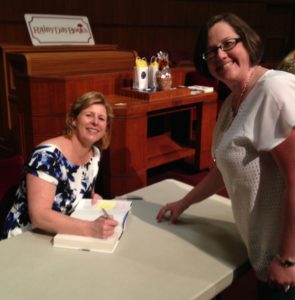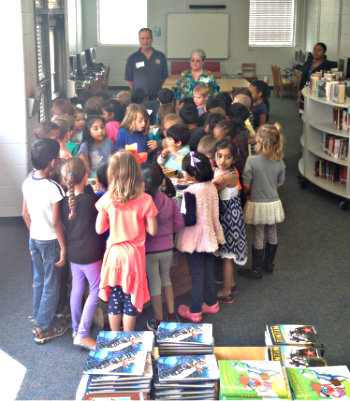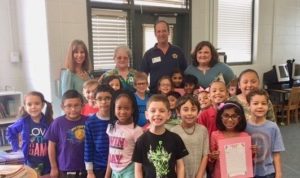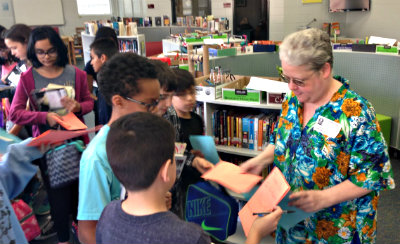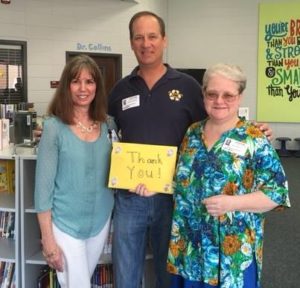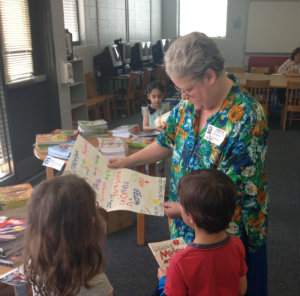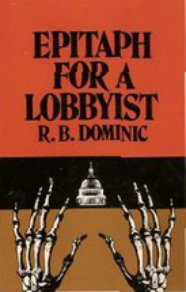Interview with Author &
PaperBackSwap Member
Mary Potter Kenyon
Mary Potter Kenyon is the author of five Familius titles:
Coupon Crazy: The Science, the Savings, and the Stories Behind America’s Extreme Obsession, Chemo-Therapist: How Cancer Cured a Marriage, Refined By Fire: A Journey of Grief and Grace, and Mary & Me: A Lasting Link Through Ink, (with co-writer Mary Jedlicka Humston), and a grief journal slated for publication in early 2018.
Mary has graciously offered to be interviewed here on the PaperBackSwap Blog.
Welcome Ms. Kenyon and thank you for agreeing to this interview!
Thank you for featuring me and my books.
You wrote your book, Refined by Fire in the two years following the death of your husband of 34 years. Where and how did you find the courage to share such a personal journey?
I’d already written about caring for my husband David during his cancer treatment in my book “Chemo-Therapist: How Cancer Cured a Marriage.” Our marriage relationship was revitalized through that cancer journey, and David was a five-year survivor when he had a heart attack. After writing my way through caregiving in 2006 it seemed only natural to write my way through grief, too. Within months of my husband’s death, I was facing the loss of grandson who was battling terminal cancer. Writing and reading is how I’ve always faced things, even as a teenager. I wrote “Chemo-Therapist” because every book I picked up about caregiving through cancer ended in the death of the cancer patient. I wasn’t about to read those, so I wrote my own, a story of love, hope, and a revitalized marriage relationship. My husband always told me it was a love story, not a cancer story. David had been the biggest supporter of my writing. “Coupon Crazy” was his idea, “Chemo-Therapist” was our love story, and “Refined By Fire” was written because of the loss of him. Pieces of my personal journal and blog appear in “Refined By Fire,” revealing the rawness of grief. I wrote it with blood, sweat, and tears, and it is the book I am most proud of. I knew I wouldn’t be able to help others in their own journey if I wasn’t willing to be completely open and honest in my writing.
In your book you quote many other authors on the theme of loss and grief. One of my favorites is by Anne Lamott:
“You will lose someone you can’t live without, and your heart will be badly broken, and the bad news is that you never completely get over the loss of your beloved. But this is also the good news. They live forever in your broken heart that doesn’t seal back up. And you come through. It’s like having a broken leg that never heals perfectly—that still hurts when the weather gets cold, but you learn to dance with the limp.”
Do you have a go-to quote? One that usually helps you to put things in perspective?
For years, I’d utilized my personal journal to jot down quotes or paragraphs from books I was reading, words that inspired me or said perfectly what I was feeling or experiencing. I’d noticed other authors using quotes at the beginning of their chapters, particularly in non-fiction, and I wanted to do the same thing. The idea was that if that author’s words spoke to the reader, they’d want to read more. I love leading readers to other books and authors. Lo and behold, one day I learned that there was actually a term for the quotes at the beginning of a chapter; epigraph. Now, I use epigraphs in all of my books. I don’t have a single favorite quote. Depending on what is going on in my life, it changes. At various times, I’ve even taped a quote to my desk, or carried one in my purse, usually when I am struggling with something and need inspiration or encouragement. I’m also drawn to journal, calendars, wall plaques and stationery with inspiring quotes.
What would you like to share with others who are going through grief and loss?
In my upcoming journal, I write about how many weeks went by after our downstairs and upstairs hallway lightbulbs burnt out. I couldn’t bring myself to haul out the ladder and replace them. That was something my husband had always done. I didn’t ask anyone else to do it, either. In fact, my teen daughters thought something had gone wrong with the switches. We adjusted to the newly darkened hallways. We’d leave the light on and the door open in the upstairs bathroom so we could see the steps at night. We’d open the downstairs bathroom and turn on that light to illuminate the dark hallway closet. We lived that way for months until one of my older daughters was helping me clean out the closet and wondered out loud why the hallway light wasn’t working. My daughters were horrified when I admitted I hadn’t gotten around to changing the lightbulbs. My point? It is a very dark night of the soul when we lose a loved one. But there are things we can do for ourselves during that dark period; read books by those who have gone down the path before us, attend support groups, reach out to others in our newly discovered empathy, or by journaling. We have the ‘lightbulbs,’ or the tools for healing available to us. We just have to utilize them.
You are Senior Services librarian at the Dyersville, Iowa library. Have books always been a part of your life?
As a child growing up in poverty, I thought only rich people owned books. I learned to read before I attended school, and spent hours learning to print my name so I could obtain the coveted library card. It was a rite of passage in our family. During the summer, my two younger sisters and I would check out five to six books each on a Friday, and by Monday morning we’d have finished our own and be trading with each other. I worked at the same little local library as a teenager every summer, and again (with the same boss!) for a couple of years before my eighth child was born. When I needed to find work after my husband’s death, my first job was as a director of a small library. Then I worked as a newspaper reporter for eighteen months, what some would consider the perfect job for a writer. But it felt as though the endless meeting coverage, Beef and Pork Queen, corn stories, and legislative coffee coverage was killing me creatively. Now I’m back in a library, doing all my favorite parts of the job, without the responsibilities of a Director, and working on a book about using creativity in everyday life. I always dreamed of being an author or a librarian when I grew up, and now I’m both.
How did you find PaperBackSwap? Any special memories?
I’ve always wanted to own a lot of books. I don’t trust anyone who doesn’t have shelves of books in their home. As a teen, I saved every penny of my babysitting money to purchase cheap Scholastic paperbacks. When I began homeschooling in 1992, I had a wonderful excuse for buying books. And for a short while, my husband and I even operated a used bookstore, so I had ready access to books. During that period of time, I was bartering books for clothing, toys, and educational materials for my children, so the idea of swapping books was nothing new to me. I’ve been a member since shortly after its inception, so I can’t even remember how I discovered it.
I’ll never forget the day a man came to our door, a book in his hand, his wife waiting for him by the car. His name was Pete, and though I can’t remember what state he’d traveled from, he was passing through Iowa to go to a wedding and he’d decided to hand-deliver the children’s book I had ordered. My husband and I stood on the porch together, listening to this man’s story. He’d been diagnosed with Parkinson’s and he’d consciously made the decision to live every day of the life he had left. His wife came up on the porch and talked to us, too, with tears in her eyes. Their time together was limited, and this man was hand-delivering books to other book lovers, just to touch their lives in some way. He touched ours. After the couple left, David and I sat on the couch and held hands, quiet. His cancer treatment had given us a whole new perspective on life, but meeting Pete gave us a renewed determination to appreciate life and each other. I wrote him later, to tell him how much his gesture had meant to us. It was the next year that I lost David, and I have wondered since about this couple and the gift they had given us in the reminder to cherish each other.
Did you read as a child? What was your favorite book growing up?
I was an avid reader as a child, reading anything I could get my hands on. I’ve collected some of my favorites and have a shelf full of childhood reads; books by Lois Lensky, Jean Little, Elizabeth Enright. I loved anything I could identify with and even spent a summer spying on my neighbors, thanks to “Harriet the Spy.” As a teen working at a library, I started with the “A” authors, working my way through the alphabet and the shelves full of adult fiction, certain that by the time I’d graduated, I’d read every book in that library.
And now, what do you read? Do you read for entertainment? For escape? For knowledge? How many books are there in your To Be Read Pile?
I do a lot of research when I am working on a non-fiction book, so right now, I have 12-15 books on creativity in my to-read pile, but when I need a break from non-fiction, there are 10 fiction books in another pile, waiting to be read. I am a big believer in life-long learning, so I read a lot of non-fiction. I keep track of the books I read (and want to read) on Goodreads.com, and my (modest) goal this year is to read 50 books. I read 65 last year, approximately 60% non-fiction.
Mary Potter Kenyon graduated from the University of Northern Iowa with a BA in Psychology. She is Senior Services librarian at the James Kennedy Public Library in Dyersville, and a certified grief counselor. She is widely published in newspapers, magazines, and anthologies. She is the author of six books, including the award-winning “Refined By Fire: A Journey of Grief and Grace,” and a grief journal slated for publication in early 2018. Mary is a popular public speaker and workshop instructor. See her website at www.marypotterkenyon.com.
Mary Potter Kenyon has generously offer a copy of 4 of her books to a PaperBackSwap Member who comments here on the blog. A winner will be chosen at random. Good luck!







